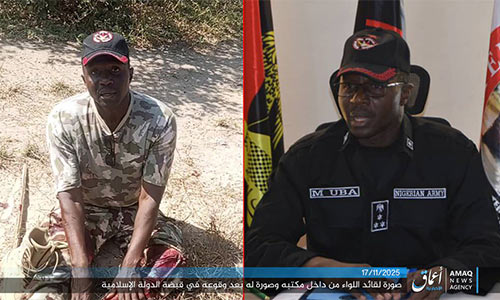West Africa Province (ISWAP) has reportedly executed General Uba, the Brigade Commander of Damboa, Borno State, hours after he was declared missing during operations in the forest. The development comes following a failed rescue attempt, raising concerns about the safety of frontline officers and communication protocols within the military.
Military sources revealed that General Uba had earlier sent a video message to colleagues indicating he was unharmed and safe. In the clip, he appeared calm, prompting initial hopes for his recovery. Sources, however, told DailyPost that the officer later became disoriented while navigating the forest, triggering urgent rescue efforts involving ground troops and Nigerian Air Force (NAF) assets.
At one point, he reportedly informed his team that he was heading back to base, giving the impression he would be recovered alive. Subsequent reports, however, indicate that ISWAP militants intercepted information about his location, recaptured him, and executed him.
The Nigerian Army had earlier announced that the Commander had safely returned to base, a claim now contradicted by emerging details. His death has intensified scrutiny over the military’s handling of frontline personnel and the accuracy of official communications regarding troop welfare.
The tragedy follows a joint operation by Nigerian Army troops and Civilian Joint Task Force (CJTF) members in the Damboa–Biu axis, aimed at countering ISWAP ambushes. During the operation, the Brigade Commander led troops through a booby-trapped route and ordered a tactical withdrawal after encountering superior enemy numbers. NAF aircraft intervened, providing critical support that allowed troops and CJTF members to escape.
Sources report that the operation resulted in significant ISWAP casualties, with minimal losses on the military side. Nevertheless, the killing of General Uba underscores the persistent operational risks faced by officers in the North-East and the urgent need for secure communication protocols to safeguard military personnel.

